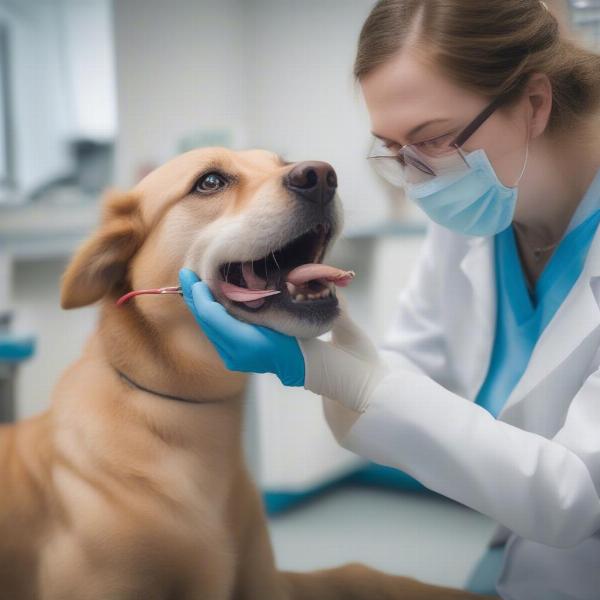Dentisept for dogs is an oral rinse containing chlorhexidine gluconate, an antiseptic with antibacterial and antifungal properties. It’s commonly used to manage gingivitis, periodontal disease, and other oral infections in dogs. Understanding its uses, benefits, and potential side effects is crucial for responsible pet ownership. This guide will delve into everything you need to know about Dentisept for your canine companion.
Understanding Dentisept and its Uses
Dentisept is a powerful tool in maintaining your dog’s oral health. It works by killing bacteria and fungi that contribute to plaque and tartar buildup, the primary culprits behind gum disease. Veterinarians often prescribe Dentisept after dental procedures to prevent infections and promote healing. It’s also used for ongoing management of chronic oral conditions.
While effective, Dentisept isn’t a substitute for regular brushing and professional dental cleanings. Think of it as an additional weapon in your arsenal against canine dental disease. It’s crucial to use Dentisept as directed by your veterinarian to avoid potential side effects.
Administering Dentisept Safely and Effectively
The proper administration of Dentisept is key to its effectiveness and your dog’s safety. Always follow your veterinarian’s instructions regarding dosage and frequency. Typically, Dentisept is diluted with water before being applied to the affected areas of the mouth. You can use a syringe, a dedicated oral rinsing solution applicator, or even a spray bottle to apply the diluted solution.
Avoid getting Dentisept in your dog’s eyes. If this happens, rinse thoroughly with water. Some dogs may resist the application process. Patience, positive reinforcement, and making the experience as stress-free as possible are crucial.
Potential Side Effects and Precautions
While generally safe, Dentisept can cause side effects in some dogs. These can include temporary staining of the teeth, a bitter taste, and rarely, vomiting or diarrhea. dentisept dogs is not recommended for dogs with known allergies to chlorhexidine. If you notice any unusual symptoms after using Dentisept, contact your veterinarian immediately.
Is Dentisept the Right Choice for My Dog?
Whether or not Dentisept is suitable for your dog depends on their specific needs and health condition. Your veterinarian is the best resource to determine if Dentisept is appropriate for your furry friend. They will consider factors like your dog’s age, breed, overall health, and the specific oral issue being addressed.
 Veterinarian Examining Dog's Teeth
Veterinarian Examining Dog's Teeth
Keeping Your Dog’s Teeth Clean: Beyond Dentisept
While Dentisept is a helpful tool, it’s crucial to remember that it’s only part of a comprehensive dental care routine. Regular brushing with a dog-specific toothpaste, dental chews, and professional cleanings are essential for maintaining your dog’s oral health. mouthwash for dogs can also be a useful addition to your dog’s dental hygiene routine.
Conclusion
Dentisept can be a valuable tool in managing and preventing oral health issues in dogs. When used correctly and under the guidance of a veterinarian, it can significantly improve your dog’s oral hygiene. Remember to always follow your veterinarian’s instructions and monitor your dog for any potential side effects. dental mouthwash for dogs can contribute to a healthier and happier life for your canine companion.
FAQ
- How often should I use Dentisept on my dog? The frequency of Dentisept use depends on your veterinarian’s recommendation, but it’s typically used once or twice daily.
- Can I use human mouthwash on my dog? No, human mouthwash often contains ingredients that are toxic to dogs. Always use a veterinary-approved product like Dentisept.
- Will Dentisept stain my dog’s teeth permanently? While Dentisept can cause temporary staining, it’s usually not permanent and can be removed with professional cleaning.
- What should I do if my dog swallows Dentisept? While small amounts are generally not harmful, contact your veterinarian if your dog swallows a large amount of Dentisept.
- Can I use Dentisept on puppies? Yes, but always consult your veterinarian for the appropriate dosage and usage instructions for puppies. chlorhexidine for dogs should be used with caution in puppies.
- My dog isn’t drinking water after surgery, can I use Dentisept? It’s important to consult with your vet if your dog not drinking water after surgery before using Dentisept.
- Is Dentisept available over-the-counter? In some regions, Dentisept may be available over-the-counter, but it’s always best to consult with your veterinarian before using it.
ILM Dog is a leading international online resource dedicated to providing expert advice and information on all aspects of dog care and wellbeing. From breed selection and health to training, nutrition, and grooming, we offer practical, trustworthy guidance for dog owners worldwide. Our expertise also covers specialized areas like puppy care, senior dog care, travel tips, and product recommendations. To learn more about how ILM Dog can help you provide the best possible care for your canine companion, visit us at ILM Dog. Contact us at [email protected] or +44 20-3965-8624.